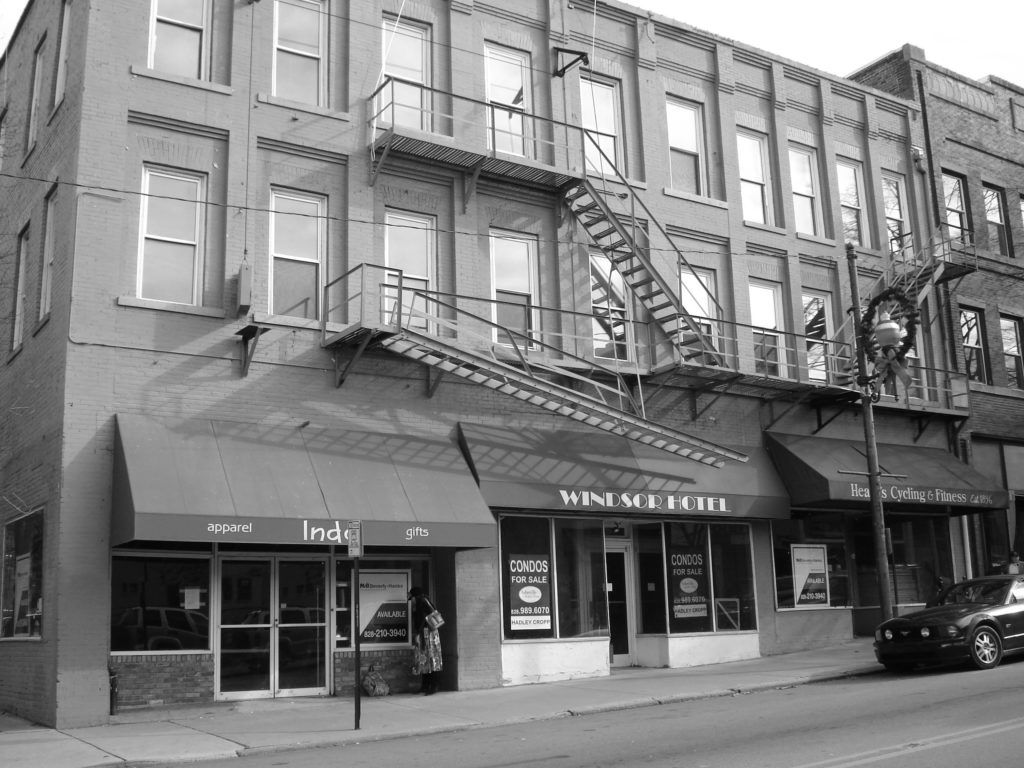The city of Asheville’s story includes a number of historic residential hotels, such as the Gray Rock Inn and Old Kentucky Home (the boarding house run by Julia Wolfe, mother of the novelist Thomas Wolfe). One especially interesting and storied building is that of the Windsor Hotel, located within an early 1900s building at 36 Broadway.
In 2012, the Windsor was purchased by a Miami Beach, Fla., gynecologist and his business partners and underwent a $2.8 million rehabilitation, reemerging two years later as the Windsor Boutique Hotel. Its suites are all between 650 and 950 square feet with complete kitchens, full-sized appliances, locally made furniture, and art and antiques acquired in Paris. The lobbies, staircases, and hallways contain works of art painted by local artists. The Preservation Society of Asheville and Buncombe County honored the renovation with a Griffin Award.
The Windsor dates back to the turn of the last century, though, “Asheville has had multiple Windsor Hotels located along what are now Biltmore Avenue and Broadway,” reveals the book Asheville Historic Inns. “In 1902, there was a Windsor on North Main Street (now Broadway), and the 1914 city directory lists a Windsor at 48 South Main Street (now Biltmore Avenue).” In 1960, another Windsor Hotel was opened at 36 Broadway.

The building is mentioned briefly in the 1978 application for the 30-block Downtown Asheville Historic District to be included on the National Register of Historic Places: “34-38 Broadway. Ca. 1910. 3-story brick commercial building and hotel. Corbelled brick cornice and string courses. Shopfronts altered. Painted.”
That hotel served an important purpose as a rooming house, offering affordable living spaces. As Asheville gained in popularity as a tourist destination, especially in the early 2000s, the last of the city’s residential hotels — once a regular housing option — were pushed out. “A downtown fixture for decades, the boarding house on the corner of Broadway and Walnut streets was one of the few remaining housing options in the central business district for people of modest means,” The Mountain Xpress reported of the Windsor in 2007. “Many long-term residents lived paycheck to paycheck. Several worked as day laborers; some had addiction problems; some were on disability or another form of fixed income.
“But on Oct. 5—the day David Madera officially took possession of the property—a memo informed residents that the Windsor was now officially the Asheville Hotel. Weekly rates would be raised (in some cases doubled), and those who cleared out within a week could be sent on their way with $250. A nonsmoking policy was also instituted, effective immediately (many residents were smokers). “Should you be unable to comply with this,” the memo stated, “you will be asked to vacate the premises.” Soon after, Madera conducted a walk-through; each room was photographed, and cooking devices like such as hot plates were removed to comply with fire-safety laws. Within a week, roughly half the guests were gone.”
In 2018, The Windsor along with four other historic Asheville properties, received permanent protection under a preservation easement program by the Preservation Society of Asheville and Buncombe County.
